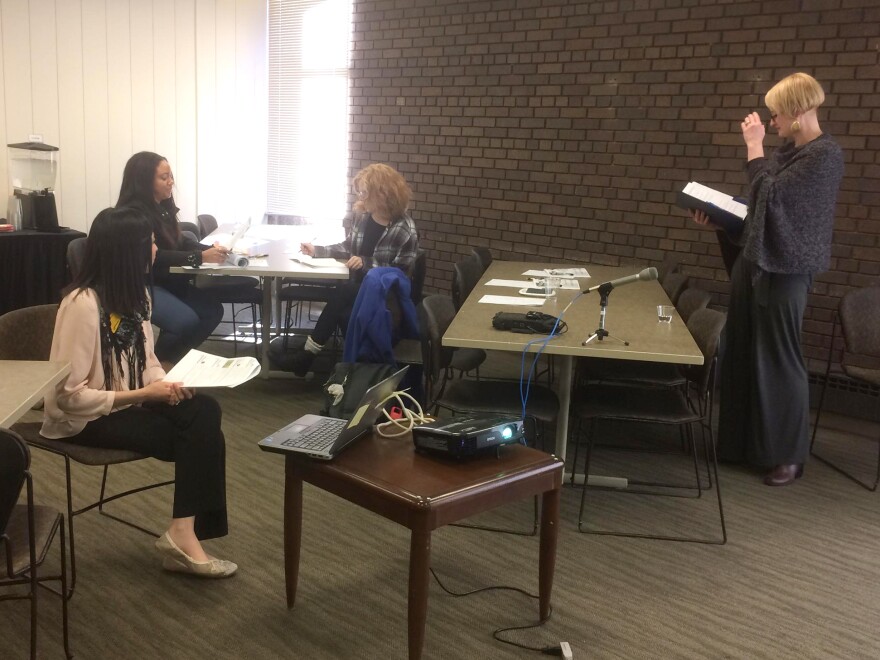In Wisconsin, the gender wage gap is 22 cents per dollar, according to the National Partnership for Women and Families. This adds up. American women are losing up to $1.5 million over the course of their lifetimes. A program at UWM is hoping to make wages more equal by teaching future graduates how to negotiate with employers.
"The place women should start carving out a better financial path for their lives is with their first job," Christine Wolf says. “I mean when I first started working it never even occurred to me to negotiate for a salary. Unfortunately, I was never taught to do that, no one ever suggested to me that that was something I should do."
Wolf is one of the facilitators of the Equal Pay Day Salary Negotiation Program at UWM, which offers occasional workshops to students in a small conference room.
"Great, so next, you got the job! Once you receive the offer you also started to negotiate," facilitator Monica Camacho says.
Only two students showed up for this last class, even though 16 RSVP’d. Amid the empty chairs and unopened workbooks, Camacho offers advice to the future grads.
“So when you receive the job offer you may also receive the starting salary number as well. If not, you should ask for what the starting salary is along with what the benefits package is. Get it in writing so that you have time to review,” she says.
Camacho shares more advice: Research your desired job beforehand and don’t be too emotional or aggressive when negotiating.
Then comes a crucial part of the program - role-playing, complete with scripts.
Facilitator Christine Wolf demonstrates the language of negotiation with instructor Alejandra Lopez.
Wolf: “We hope you’ll accept our offer of $58,000 plus benefits."
Lopez: “Thank you, I am confident I’ll bring value to the organization. However, according to my research the market rate in the area for someone in this position with my demonstrated skill set is $60,000 to $68,000 per year. Would you consider an offer within that range?"
Wolf: “Hmmm, well, I see your point. Going above $58,000 is close to the maximum salary I can offer for this position."
Lopez: “I appreciate that, however, given my experience increasing revenue by 15 percent in my current position and experience with reducing expenses I hope we can work together to come to a salary that reflects my qualification."
“This is something I’ve struggled with for a long time, as far as knowing how to negotiate things," Natasha White admits, after watching and listening to the presentation. She's a junior majoring in business.
“I think sometimes I do get intimidated easily, especially with men. And a lot of times that’s who I interview with. So I really wanted to brush up before graduating,” White says.
She says one of her biggest questions has been where to start when it comes to salary. “I’ve always wondered when you’re going too high or too low. So that’s why I’ve always refrained from saying anything. So I guess getting a number out there is the best thing I really learned,” White says.
While the focal point of negotiations may be salary, facilitator Jean Salzer urges the students to also keep benefits in mind. “If you consider that within one year a white woman makes about 78 percent of what a white man makes, then you add in the fact that benefits are usually based on salary so the benefits may be less, which include retirement benefits, so that over the course of a lifetime it can become a huge difference,” she says.
And it can all start with that first job, so instructor Christine Wolf hopes more young people begin practicing the art of negotiation and advocating for themselves.
“I think one of the barriers is that wage negotiation is still something that isn’t talked about a lot in American culture. We don’t commonly talk about how much we make just as general conversation. And so I think a lot of people, both men and women, don’t know what they’re actually missing. They don’t know what they don’t know,' Wolf says.
UWM plans to hold another two-hour workshop in fall to help students set themselves up for success and greater earnings as they grow as professionals.



